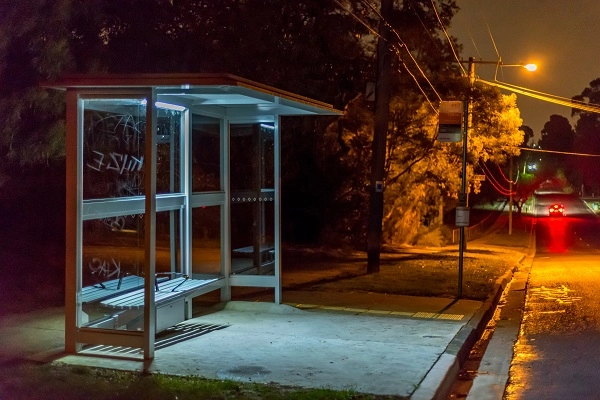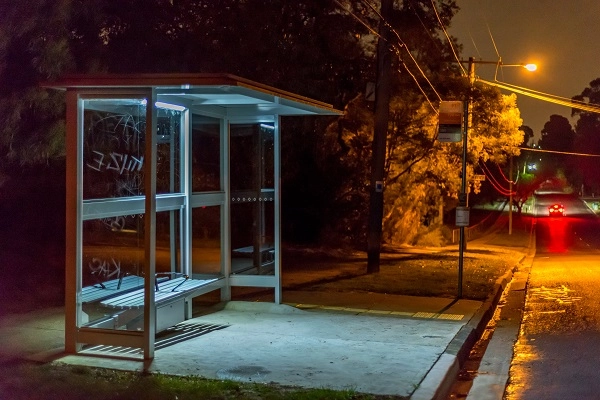Sleepless in Salem?


Bus driver Rich B. puts sleepless nights to bed
Everyone can relate to an occasional restless or sleepless night, but imagine never getting more than two to four hours of sleep a night for years on end. Welcome to Rich B.’s life.
At 58, Rich has not been able to sleep soundly since he entered ninth grade. “Even though I have lived with this most of my life, I felt like I was getting more and more tired,” said Rich. According to Rich’s wife, he kept her awake by snoring all night and gasping for air.
Being awake and alert is imperative to Rich’s job as a bus driver. Afraid he might doze off while driving, he sought the help of his physician. Rich was referred to the Salem Health Sleep Center, where he participated in an overnight sleep study, and was diagnosed with sleep apnea.
Sleep apnea is a sleep disorder caused by abnormal pauses in breathing during sleep. These pauses occur because the airway becomes partially blocked during sleep. Sleep apnea is a very common cause of sleepiness.
According to the Salem Hospital Sleep Center’s Thye Schuyler, MD, “There are various theories why sleep apnea makes people feel sleepy the following day. It is probably a combination during sleep of low oxygen, the “fight or flight” response being repetitively activated from airway closure, and the brain waking up extra times (when it should be sleeping) to reopen the airway. This process can go on all night and make people feel just as tired in the morning as they felt when they went to bed.”
The Sleep Center recommended a Continuous Positive Airway Pressure (CPAP), a breathing machine, and a sleeping pill to help Rich get a better night’s sleep. “The sleeping pill helps me fall asleep, which has always been a problem,” said Rich. “With the CPAP, I can get up to four or five hours of sleep−sometimes more−because I am breathing better and getting more oxygen.”
Rather than waking up every 20 or 30 minutes all night, the CPAP allows Rich to get quality, sound sleep. “You wouldn’t believe the difference in how refreshed and energized I feel,” said Rich. “The nights I don’t use the CPAP, I am tired after one hour of working.”
“CPAP is a safe, effective therapy that works by providing a constant gentle pressure that keeps the upper airway open like an air splint,” said Dr. Schuyler. “This allows the brain to sleep more and keeps the oxygen from dropping too low during the night.”
Dr. Schuyler asked Rich to begin monitoring his sleep more closely by keeping sleep logs. The log tracks naps, caffeine consumption, exercise, how many hours Rich is in bed, and how many hours of sleep he gets over 24 hours.
“By tracking his sleep, Mr. Beebe and I realized he was going to bed too late and was not getting enough hours of sleep per night,” said Dr. Schuyler. “He would then drink extra soda during the day to help fight the sleepiness.”
In addition to the CPAP machine, Dr. Schuyler recommended Rich lose a little weight. “I’ve been told to lose weight before, but with little sympathy,” said Rich. “Dr. Schuyler and his team are so positive and uplifting; they made me want to follow their instructions.”
According to Dr. Schuyler Rich has already started to lose weight. “He was able to decrease soda intake during the day because he didn’t need it anymore to stay awake. He has also started to exercise more. His story is very encouraging to all of us who treat patients with multiple sleep problems.”
Rich knows he is in good hands. Dr. Schuyler was trained at Dartmouth Medical Center, an Ivy League Medical Center in New Hampshire. He was trained by the former President of the American Academy of Sleep and is the only fellowship-trained sleep medicine physician in the Salem community.
Now, Rich sleeps like a baby, has more energy, and no longer worries about dozing off at work. Rich will follow-up with Dr. Schuyler in the near future to track his progress.
“I always look forward to seeing Mr. Beebe because he is healthier every time I see him,” said Dr. Schuyler.
If you regularly experience sleepless or restless nights, contact your physician and request a referral to the Salem Health Sleep Center, or call 503-561-5170.
Left untreated, sleep apnea can result in various health problems including:
- High blood pressure
- Stroke
- Heart failure, irregular heartbeats and heart attacks
- Diabetes
- Depression
- Worsening of ADHD
Sleep apnea can affect anyone and can result in poor performance in everyday activities, vehicular accidents, and academic underachievement in children and adolescents.
Common risk factors for sleep apnea include:
- Male gender
- Being overweight
- Being over the age of forty
- Having a large neck size (17 inches or greater in men and 16 inches or greater in women)
- Having large tonsils, a large tongue or a small jaw bone
- Having a family history of sleep apnea
- Gastroesophageal reflux or GERD
- Nasal obstruction due to a deviated septum, allergies or sinus problems